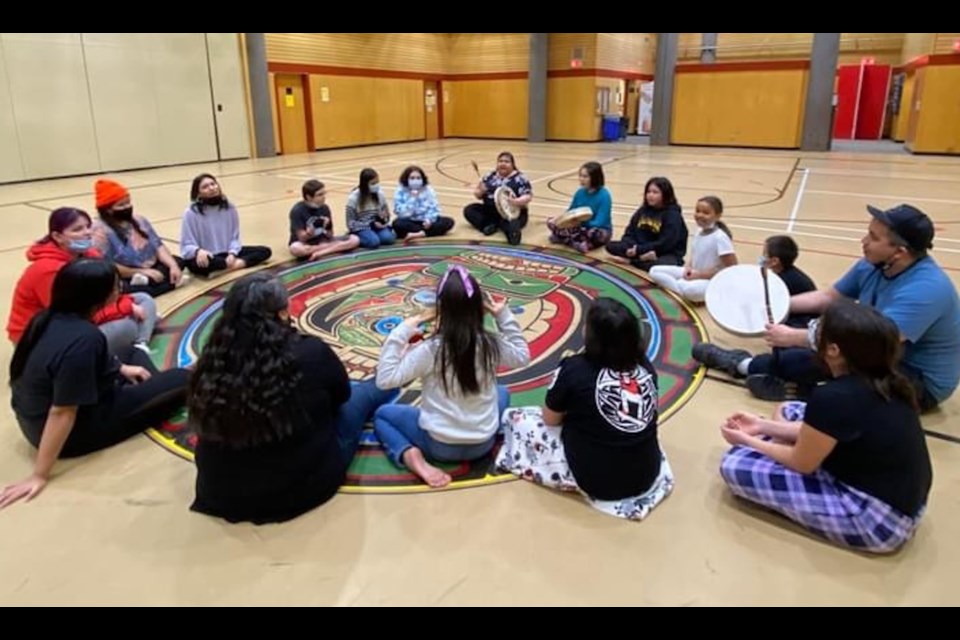After a lengthy hiatus due to COVID, Sḵwx̱wú7mesh Úxwumixw (Squamish Nation) youth are once again learning and practising their culture together.
On Feb. 17, the Nation's Welhtima Kexwusem song and dance group held its fourth gathering at Squamish's Totem Hall since the pandemic restrictions were lifted.
"It's been a tough year, but so happy to get back to practising our culture again. Everyone was really missing it," said Charlene Williams, who has been teaching and facilitating for the group for about 20 years.
The group has seen the return of its previous members and more — a fresh wave of newcomers, mostly young children between ages seven and nine.
There were over 20 children, mostly aged seven to 15, and there were also older members in their 20s who learned as kids and still come to help teach the culture.
Williams said the return of practice has been a joyful occasion for her.
"For me, it's just a joy," she said.
"The youth are so happy to be able to be back gathering doing something that they love. I love seeing the pride of the parents when they get a chance to see the pictures or watch the videos of their child."
Williams said she was in a dance group when she was about five years old and as a teen.
"I remember how much strength it gave me in my life in the way that I walked in the world, and so it just makes me feel so happy to be able to contribute in a small way to carrying that forward and providing that for other young people," she said.
Williams said that many of the songs, dances and drumming have a rich history behind them that have been passed down for generations.
There's always a story behind each song and dance.
"For instance, we do a warrior dance that comes from one of our ancestors, and the song's over a hundred years old," she said.
"It's really important to our elders and our community…because it's not only music, singing drumming and dancing. There's a history — a very rich history — that goes along with the song's teachings' lineage. Who our ancestors are, and how they carried themselves, and what they've done for us. Because it's really important for our youth to know that we only have these songs and dances because of the strength of our ancestors, because, for a time in Canada, it was actually against the law for us to practice our culture."
For example, she said, potlatches were banned and permits were required every time someone wore their regalia.
As a result, there are many who have lost touch with the culture.
"It's not because it wasn't important to their families. It was because it was stolen from them," Williams said.
"And so, it's important for our youth to have pride in the fact that our ancestors, even though it was hard for them, they still worked to keep our culture alive, to carry forward these teachings and these stories — the songs and the dances."
Williams said that before COVID-19, the group had a track record of performing all across the Lower Mainland and more.
For example, the older members — who are now teachers of the group — did an exhibition for the Paralympics when it opened in Squamish, as well as a cross-cultural event in Hawaii, she said.
When things start to open up more, Williams hopes that they can once again begin sharing their culture with everyone.
"We've had the chance to go out and share what we have learned with others to try and build bridges of understanding and to share how rich and beautiful our culture can be," she said.
"We really look forward to having a chance to go out and share our culture with others again."



